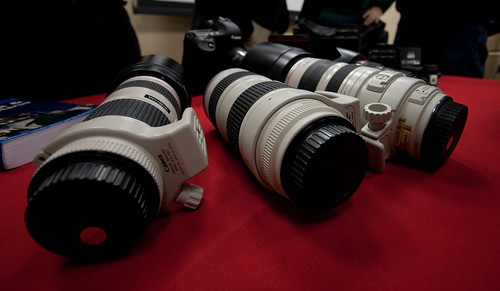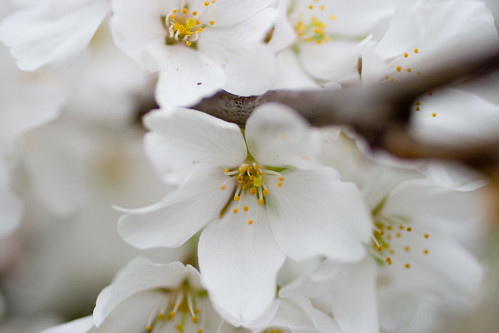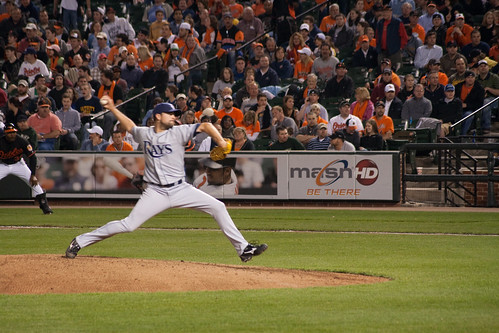Actually, Size DOES Matter
By EricMesa
- 5 minutes read - 956 words[caption id="" align=“aligncenter” width=“500” caption=“My two Canon DSLRs”]  [/caption]
[/caption]
Recently I’ve been seeing and hearing a lot of people repeating some version of the mantra, “a great photographer can make a great photograph with any camera.” They’ve then been following this up with, “therefore, why not just use an iPhone or point and shoot. There’s no reason to buy an SLR anymore.” Like everything else in life, the truth is gray rather than black and white.
[caption id="" align=“aligncenter” width=“500” caption=“An example of a good photo taken with a 1 MP cell phone camera”]  [/caption]
[/caption]
The most important aspect of any photo is the composition, the placement of the subject(s) in the frame. This is the root behind the statement that a great photographer can use any tool to make a great photograph. A $30,000 medium format camera will not improve your composition skills and a 1 MP cell phone camera will not impede it. So, yes, in this sense it doesn’t matter what kind of camera you have. You need to work on learning composition. And, just like other trite phrases like “quitters never win”, the point of the statement is to get someone to think a certain way, not to actually convey useful information. After all, only one non-quitter wins. But “quitters never win” is better at getting someone to try hard than “perseverance will give you a chance at winning.”
I mean, if it didn’t matter what camera you used as long as you got great results, why would anyone ever buy an SLR? Why not all use polaroids or Holgas? Because the truth is that size DOES matter. There are many things you can do with an SLR that you can’t do with a basic camera. First of all, an SLR allows you to change lenses so you are not stuck with whatever compromises the manufacturers decided upon. If I want to focus on bird photography, I can invest in long lenses. If I want to take photos in low light, I can focus on fast lenses. You can’t do any of that with a point and shoot and it’s going to limit your abilities. Sure, a great photographer can frame the shot, but if he’s across the yard, you won’t be able to see the bird in the branches.
[caption id="" align=“aligncenter” width=“500” caption=“Some of the amazing lenses you can buy for a Canon DSLR”]  [/caption]
[/caption]
Another way in which the difference matters is in sensor size. I’ve seen my brother’s photos with his iPhone and his photos with the point and shoot I bought him for his trip to Japan. The difference is monumental. So, again, it doesn’t matter how awesome you are at framing the image if it’s all fuzzy because the sensor was too small. The same goes with SLRs and point and shoot cameras. When it comes to getting good low light performance a larger sensor will always perform better given the same technology.
Another benefit to larger cameras is that they give the photographer control over every aspect of the shot such as shutter speed, aperture, and manual focus. Some point and shoot cameras also offer these features, but in less convenient ways because they are meant for advanced users and the manufacturers don’t want the amateurs to be confused. Going back to the phrase, it doesn’t matter how well you can compose a shot if you can’t control the aperture. After all, without this control you don’t have the ability to determine whether the background is a pleasant blur or in focus. You can’t freeze action if the camera doesn’t automatically pick that shutter speed for you.
[caption id="" align=“aligncenter” width=“500” caption=“I was able to achieve this dreamy look simply because I was able to choose the aperture with my DSLR”]  [/caption]
[/caption]
So, what it comes to is that having smaller or less-featured cameras ends up being a hindrance. The aspiring photographer will come up against a brick wall. He will wonder, “If the camera I have doesn’t matter, why can’t I get shots like that?” The answer is that the equipment is the limiting factor.
[caption id="" align=“aligncenter” width=“500” caption=“Without control of the shutter speed, I wouldn’t have been able to guarantee that this pitch would be frozen instead of blurry with motion.”]  [/caption]
[/caption]
Of course, another reason for this saying is to keep people from upgrading too quickly. It’s an example of “lies to children”. If you know the person doesn’t understand photography, it’s hard to tell them that because they might take it as an insult that they aren’t “ready” to move up to the SLR world. So, instead, you lie and tell them that the camera doesn’t matter. They end up working harder and get better and better. But eventually they’ll see the deception or the frustration at not being able to achieve certain things will turn them off to photography.
I think we’re best off amending the saying as thus, “having a powerful camera is not a prerequisite to obtaining awesome photos, but it certainly helps.” To me, working with my point and shoot when I don’t have a reason to not take my SLR is analogous to when I tell myself that today will only shoot photos at 50mm. It’s a constraint - and some artists do thrive under constraints. It forces them to see things differently. But most don’t resolve to remain under those constraints indefinitely. So we shouldn’t lie to our readers and listeners and tell them that if they have an iPhone already there’s no reason to buy a point and shoot. We should encourage them to learn on the iPhone but then explore the possibilities that open up to them by using a real camera.